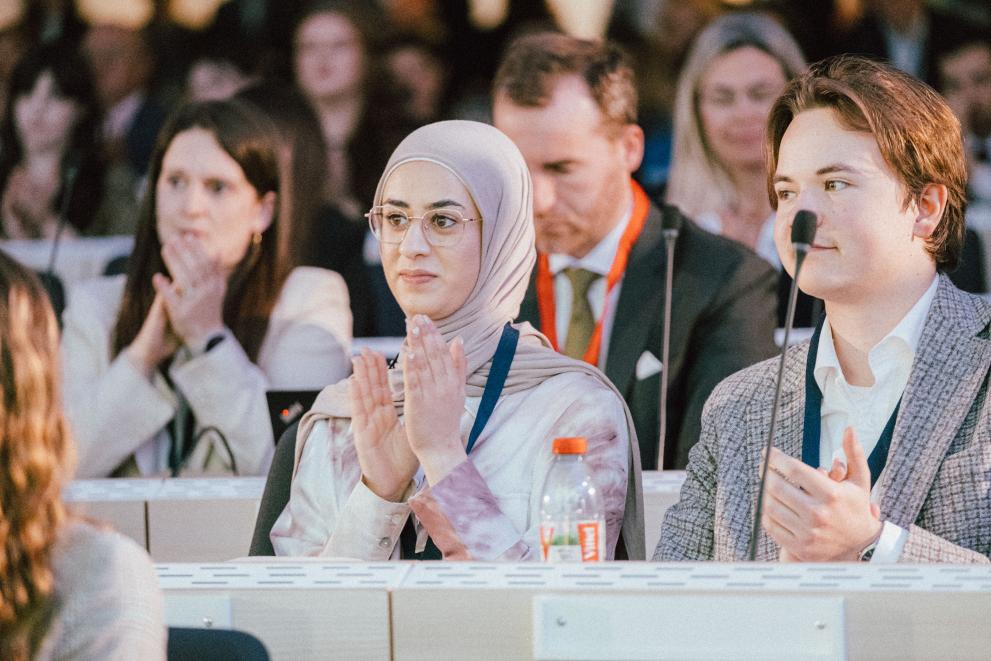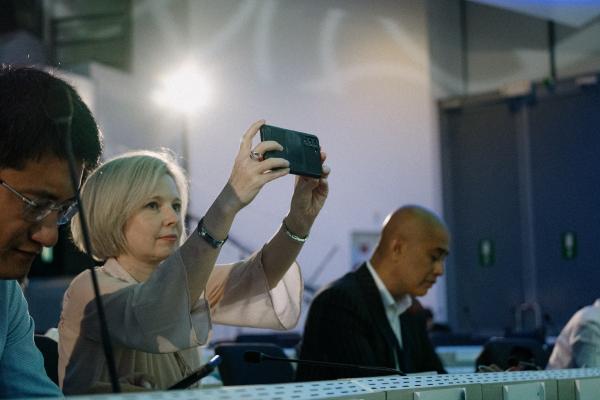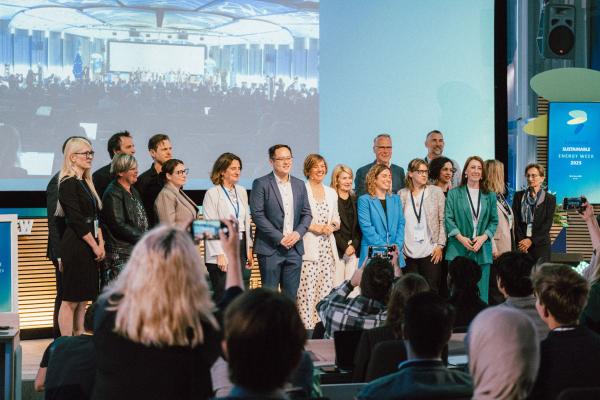This is EUSEW: highlights from Day 3

Here are a few of the highlights from the last day of EUSEW 2025. The focus for today was on energy efficiency and renewables. If you missed any of the sessions, follow the links below. Don’t forget to share your thoughts and experiences using #EUSEW2025.

It is morally unacceptable to continue to give money to a country that has attacked its neighbour. Showing up is important, talking about this is important, however the speed of the reaction has not been what it needed to be.
➢ Rewatch the session: Is Europe on track to phase out energy imports from Russia?

We need to ensure that our planning is not only for hydrogen. To integrate the system is really key. It is clear that in the beginning there will be a financial gap between the investment cost and revenues, but we need to evaluate more precisely what is the gap and which mechanism is most important.
➢ Rewatch the session: Practicalities and possibilities: repurposing existing gas infrastructures for hydrogen

Ukraine is a strategic partner that holds enormous potential in renewable energy equating to 860 GW of potential development. I don’t know any country in the European Union that could really name such a success. Please don’t exclude us from RePowerEU, because we need to be a part of it.
➢ Rewatch the session: Is Europe on track to phase out energy imports from Russia?

People need to be aware of how their behaviour affects the energy bill – this is something that I believe communities need to address. We saw that sometimes citizens were afraid to turn on the heaters or lived in darkness to reduce their living costs – not realising that often it is already part of the rent.
➢ Rewatch the session: Equitable and sustainable rural development: the role of the clean industrial deal

We visited 20 000 homes in Ghent and guided people through renovations, and our conclusion was that for every euro we invested in guidance, citizens invest 17 euro in energy renovations.
➢ Rewatch the session: Empowering cities: local energy action planning for a competitive future

We need to make sure that the right information is distributed to the right people, in the right format, by the right messengers.
➢ Rewatch the session: Energy for citizens: understanding what consumers truly need

From a national perspective in Belgium, electrification is still too expensive. Despite electricity being more efficient and cleaner, it is three to four times more expensive than gas or oil and that discourages consumers from the shift.
➢ Rewatch the session: Energy for citizens: understanding what consumers truly need

Today the European Union has capacity to produce 11 million tons to meet the demand of 8 tons of hydrogen. This is 8% of the global hydrogen demand, and close to 80% is about ammonia. Only 1% of this hydrogen is based on clean energy sources. So, there is still a lot to do to increase this percentage.
➢ Rewatch the session: Shaping hydrogen's future: a year of impact with the European Hydrogen Bank
This is EUSEW: highlights from Day 2

Here are the key moments from Day 2 of EUSEW 2025. Missed a session or want to relive your favourites? They're all available now on our online platform. Join the conversation with #EUSEW2025, share what inspired you and keep the conversation going.

Clean energy, green energy has a lower cost. It is home-grown, so it makes us more secure and more competitive. We do have an internal energy market, and we are well interconnected throughout Europe. If the sun is not shining in one place, then this place can import wind energy, solar energy from its neighbours.
➢ Rewatch the session: Keynote speech on affordable, secure and sustainable energy in a new energy reality

We are the generation that will use AI technology, be shaped by it, and eventually lead with it. That means we have to take responsibility now; we have to ensure the policies and regulations we put in place today are strong enough to protect our future.
➢ Rewatch the session: Can AI be efficient and sustainable? Going beyond energy efficiency

Data centre demands are expected to more than double by 2030 and almost triple by 2035. By 2035, it would be roughly 500 megatons, which represents 1.5% of total energy emissions.
➢ Rewatch the session: Can AI be efficient and sustainable? Going beyond energy efficiency

As we move into the context of decarbonisation, decentralisation, and digitalisation, energy is no longer just about electrons. It is about flows of affiliation, trust, emotions and meanings; the energy transition is not only economical or technical, but also deeply relational.

Issuing permits for wind projects in Poland can still take 5 to 7 years, but the gaps lie not in the regulation - the law itself nor the ‘environmental bottlenecks’ - but in the implementation. Local authorities are under-resourced and digital solutions are lacking.
➢ Rewatch the session: Implementation dialogue on permitting for renewable energy projects and related infrastructure.

We know where critical minerals will come from, and many of those countries are at the bottom of any global development index. We must ensure that this new rush for clean energy transition minerals departs from the traditional exploitative model.

Our experiences vary significantly depending on factors like race, ethnicity, income, housing status, disability, and migration status. If urban policies focus only on environmental pillars without considering these social dimensions, they risk reinforcing existing social inequalities.
➢ Rewatch the session: Net-zero or net-hype? Rethinking European cities

Investments in biodiversity are also investments into climate adaptation and resilience of the grid. Something that is essential for the secure operation of the grid. A euro we invest into biodiversity is a euro that goes into resilience of the grid.
➢ Rewatch the session: Beyond carbon: reducing the environmental impact of grids across the value chain
This is EUSEW: highlights from Day 1

Here are the standout moments from Day 1 of EUSEW 2025. If you missed any sessions or want to revisit your favourites, they are all available on our online platform and ready for you to explore at your convenience. Do not forget to join the conversation on social media by sharing your insights, highlights, and takeaways using #EUSEW2025. Let’s keep the energy alive and inspire the community with what moved you most!

We need each other, we need you all (Young Energy Ambassadors), and we need the willingness, the involvement, the creativity, and the energy of young Europeans. We owe you a sustainable, bright, and clean energy future.
➢ Rewatch the session: EUSEW Awards ceremony

To address the crises of security, climate change and competitiveness, we need to stay on track. Green transition is not the problem; green transition is the answer to these challenges.
➢ Rewatch the session: Opening session

In the European Parliament, we try to offer pragmatic solutions. The Green Deal was just the beginning, a necessary step to start talking about change. We must act now!
➢ Rewatch the session: Opening session

For the energy transition to be effective, we need three elements. Cheaper and affordable energy for the people and for the businesses. Second, we need technological neutrality: all low- and zero carbon technologies are relevant. Third, we need sustainable energy independence - let's bring as much of the energy value chain to Europe.
➢ Rewatch the session: Opening session

I really believe we need to put more emphasis on education, make sure that the university curriculum is truly responding to the market and regulatory needs.
➢ Rewatch the session: Debate with Ambassadors

My recommendation for the EU is to set country targets and stay as much as possible out of the details. As consumers, we also have a certain choice about supporting the energy transition.
➢ Rewatch the session: Debate with Ambassadors

Decarbonisation is about climate, competitiveness and independence, and all three will continue to matter a lot going forward. That is what is at the heart of the Clean Industrial Deal that we launched with the Commission in February this year.

We know that Europe is the fastest warming climate currently. The storms we saw are a demonstration of how energy security should not just be an add-on. If we are not able to ensure a stable energy supply to our industry and citizens. We need to also be ready for potential crises of the future, so that our systems stand the test of time.
➢ Rewatch the session: Powering the energy transition: addressing emerging security threats and ensuring resilience

The 2025 winners were announced during the Awards Ceremony on Tuesday 10 June 2025 in Brussels.

Watch the video of the 2025 Young Energy Ambassadors summarising their call for a clean energy future in Europe.

The European Youth Energy Day (EYED) returns to EUSEW 2025 with a vibrant programme empowering young professionals and youth organisations to help shape Europe’s clean energy future.
Nearly 60 Young Energy Ambassadors (YEAs) will take part in EUSEW, leading a policy session, engaging in high-level debates, a European Parliament role-play, and a workshop with Commission experts. They can also help you to explore Europe’s energy landscape in a new, interactive way, and answer your questions about clean energy jobs during a careers clinic hosted during the breaks throughout the Policy Conference at the DG ENER and CINEA stands at the Energy Fair.
Curious if there is a Young Energy Ambassador from your country? Check the list linked below!

From researchers and start-ups to associations, energy communities and consumer groups, EUSEW’s Policy Conference sessions and Energy Fair brings them all together under one roof. This is your opportunity to meet a diverse network of energy experts committed to a sustainable future. Whether you are joining us in Brussels or online, explore who’s attending EUSEW 2025 and grow your clean energy network!
From our media partners
EUSEW’s media partners are dedicated to delivering insightful, high-quality coverage of the most pressing topics in energy, sustainability, and European policy.
This week, EUSEW is making headlines across Europe. Stay informed by connecting with our trusted media partners and follow the conversation throughout the event, and beyond.








